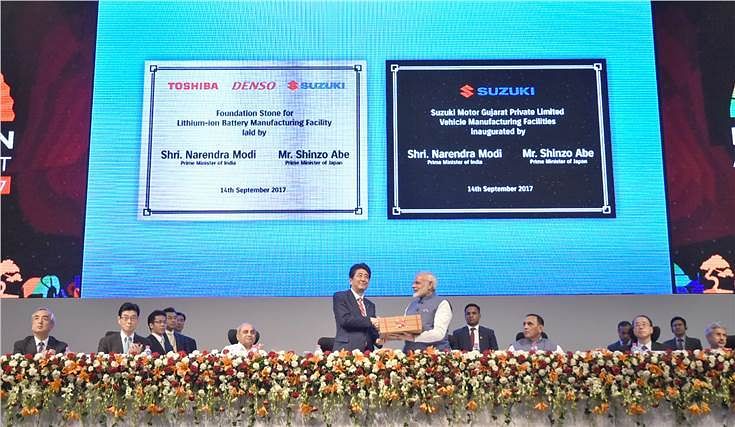Suzuki Motor to set up lithium ion battery recycling plant in India
Japanese automaker, which is setting a li-ion battery making plant in Baharaji, Gujarat, adopts 3R (Reuse, Rebuild and Recycle) mantra; plans to set up li-ion battery recycle centre.
Four months after it signed an MoU with the Gujarat government for setting up of a Rs 4930 crore lithium ion battery plant in Bacharaji, near Ahmedabad, the Suzuki Motor Corporation- (SMC) backed Automotive Electronics Power Pvt Ltd (AEPPL) is now also planning to set up a lithium ion battery recycling facility in the future.
According to Hisashi Takeuchi, Managing Officer and Deputy Executive GM (global automobile marketing) at Suzuki Motor Corporation, the Japanese automaker has adopted the system of 3R (Reuse, Rebuild and Recycle) to ensure safety and scrapping of lithium ion batteries. An appropriate 3R system needs to be established in Indian market, which factors in experiences from other developed markets. For that legislation by the government is required. "We are planning to establish a lithium ion battery recycling centre in future," said Takeuchi. Takeuchi was speaking at the Global Electrification Mobility Summit on the sidelines of Auto Expo 2020 which is being held in Greater Noida.
Takeuchi claims that SMC is working to expand production capacity and localise lithium ion battery parts in India. In addition, parts such as motor and inverter are also likely to be localised.
AEPPL, which is based in Hansalpur, Ahmedabad, is a JV in which SMC holds 50 percent stake while Toshiba and Denso hold 40 percent and 10 percent respectively. The company will manufacture 30 million cell per year in 2025 with production capacity of more than 1GWh.

The first phase of development will see investment of about Rs 1,250 crore by the end of 2020. The second phase is reported to see an investment of about Rs 3,715 crore. The foundation stone for the plant was laid on 14 September 2017, jointly by Prime Minister Narendra Modi and Japanese Prime Minister Shinzo Abe (pictured above).
As per a presentation made by Takeuchi, Suzuki Motor Corporation has suggested some key pointers for future localisation, as under:
- An incentive scheme to promote localisation of EV components.
- Domestic EV component manufacturing industry should be protected from imports till the whole ecosystem is developed in India.
- Provide support on import of machinery to manufacture EV components
- Rationalisation of tax structure on strong hybrid vehicles and plug-in hybrid vehicles.
- New safety standard for EV lithium ion batteries.
- Discourage manufacture /import of low quality (unsafe) lithium ion batteries in India.
RELATED ARTICLES
Cosmo First diversifies into paint protection film and ceramic coatings
The Aurangabad, Maharashtra-based packaging materials supplier is leveraging its competencies in plastic films and speci...
JSW MG Motor India confident of selling 1,000 M9 electric MPVs in first year
The 5.2-metre-long, seven-seater luxury electric MPV, which will be locally assembled at the Halol plant in Gujarat, wil...
Modern Automotives targets 25% CAGR in forged components by FY2031, diversifies into e-3Ws
The Tier-1 component supplier of forged components such as connecting rods, crankshafts, tie-rods, and fork bridges to l...






 08 Feb 2020
08 Feb 2020
 23828 Views
23828 Views





 Autocar Professional Bureau
Autocar Professional Bureau




